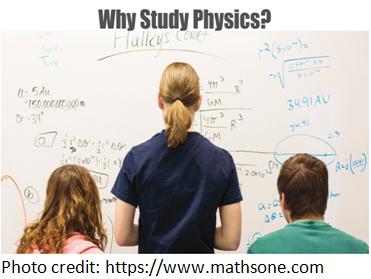Selection of subjects at higher classes in school (after 10th) and at college in general and during admissions at the corner in particular, advises and brain storming sessions start towards deciding the future course of study. Prospective students are many times asked to exercise their choices but many a times they are also compelled or forced by so called learned people to decide on the course of subjects of their study. Many a times these type of advises not make things simple but confuse the candidates. Many options with many advantages of subjects and their combinations (degrees) are available to the prospective candidates to move ahead. So, it is better to present things in a more prospective manner to the candidate about the choices giving him a free hand to decide on his selection of subjects. Physics scares off many students and is mistaken as a hard subject to study but me who have studied Physics in B.Sc. (Non-Medical), M.Sc. (Physics) and then Ph.D. (Physics) would like to present to the prospective candidates the attributes of studying Physics in order to encourage them to study Physics.
About Physics
Considered as the most basic and fundamental science, physics is important to understand the world that is around us, inside us and beyond us. The beauty of physics is that it challenges our imaginations with ideas like string theory and relativity and leads to brilliant discoveries like computers and lasers. The technologies that sprout from the understanding of physics change our lives – from curing cancer to developing energy solutions – physics does it all. Physics is a vast field of study that covers the study of the universe from the largest galaxies to the smallest subatomic particles. The goal of physics is to understand how things work from first principles. Courses in physics reveal the mathematical beauty of the universe at scales ranging from subatomic to cosmological. Studying physics strengthens quantitative reasoning and problem solving skills that are valuable in areas beyond physics. Physics students learn how the laws of nature can be used to explain the many phenomena of our world. Most students are excited to find that elementary principles, many of which are learned in introductory physics courses, may be used to solve seemingly complex problems. This ability to apply the simple principles that underlie complex problems will serve students well in the interests and careers they pursue after graduation.
Physicists are a curious and ambitious lot with an aim to understand the fundamental principles that describe and govern all physical aspects of the universe. Historically called “natural philosophers,” physicists investigate by means of controlled experimentation and mathematical analysis. Physics plays an important role in many of the liberal arts disciplines and contributes to society’s understanding of such areas as energy, weather, medical science, and space exploration. It is sufficient to say that because physics is a fundamental science with applicability to a wide range of length scales, virtually any field of science can be touched directly from the background that a physicist has. Physics, the most basic of the sciences, has intellectual and useful aspects. The intellectual component resides in our innate desire to understand the physical characteristics of our universe. The usefulness is evident everywhere in high-tech products and computerized communications. Many of the technological advances in our modern society flow directly from physics laboratories, such as the many applications of lasers, or the possibility of high speed levitated trains relying on high temperature superconductors. Much of the equipment and technology used by other scientists and medical doctors were originally developed by physicists, including x-rays, lasers, and MRIs. These are just several examples of exciting applications which resulted from intellectual endeavors in physics. In addition, productive citizens in this technological age must have a basic understanding of physics.
Career prospects with Physics
Studying physics is a great preparation for almost any career, because it teaches students how to analyze complex problems and give them a strong quantitative background that can be applied in any technical field. Students who study physics are prepared to work on forefront ideas in science and technology, in academia, the government, or the private sector. Careers might focus on basic research or in more applied research. A person who has a thorough understanding of physics can be a great problem solver too. The analytical skills of physicists make them versatile and adaptable. The problem-solving and analytical skills learned as a physics student will serve well in any career. Graduates with a major in physics find employment in the various areas of physics and other physical sciences; in technological and health industries; in financial services; and in computer science, library science, education, communication, law, and medicine. In some of these areas advanced study may be necessary. Many students who earn a bachelor’s degree in physics continue their studies towards a graduate degree in physics or a related field of natural science or engineering. Students who have demonstrated their abilities with a good record in an undergraduate physics program are favorably considered for admission to professional schools.
There is no denying that physics is a difficult subject to study and many students will simply choose less challenging subjects. However it is important to remember that studying physics also has great rewards. For those with an ambition to be at the forefront of developing technologies and theories that describe our reality it is necessary to study physics. A physics student usually possesses excellent analytical, quantitative and problem solving skills. They have the ability to synthesize and analyze large quantities of data and present their analysis in an easily understandable form. When faced with a particular problem they are taught to systematically identify all factors contributing to the problem and work out how those factors interact in order to solve the problem. These are valuable skills that can be applied in a range of careers. More importantly an increasing number of employers are starting to realize this fact and are looking to hire physics graduates.
A degree in physics provides opportunities for challenging and exciting careers in many professions, because physics teaches skills that are transferable to these professions. These skills include problem solving, analytical abilities, mathematical modeling, design and interpretation of experiments, research experience, and communication skills. A bachelor’s degree in physics can give you a solid foundation in the fields of Journalism, Law, Finance, Medicine, Engineering, Computer Science, Astronomy and Biology, Space research and much more. Technically sound and skilled physicists get paid a hefty salary as well. Even when the job market is slow, physicists get job offers—well paying jobs. Employers know that a physicist brings additional skills with expertise and pay accordingly. That’s why physics graduates can expect career salaries similar to those of computer science and engineering majors.
Attributes of Physics
- Physics teaches to think and helps to develop critical thinking and problem-solving skills
- Physics explains or try to explain all around us
- Physics makes things possible (or Physics is behind all the technologies) e.g., Grocery laser scanners, Space rockets, Light bulbs, Digital cameras, Cars, Cell phones, Airplanes, Solar panels, Fiber optics, DVD players, Computers, MP3 players, Flatscreen TVs and many more
- Physics is interesting and helps us to understand how the world around us works
- Physics helps us to organize the universe. It deals with fundamentals, and helps us to see the connections between seemly disparate phenomena
- Physics gives us powerful tools to help us to express our creativity, to see the world in new ways and then to change it
- Physics provides quantitative and analytic skills needed for analyzing data and solving problems in the sciences, engineering and medicine, as well as in economics, finance, management, law and public policy
- Physics is the basis for most modern technology, and for the tools and instruments used in scientific, engineering and medical research and development. Manufacturing is dominated by physics-based technology
- Physics helps you to help others
- Physics opens the door to many career options
- Physics is challenging
- Physics students are inventive thinkers.
Physics and society
The importance of physics to society today is most easily represented by our reliance on technology. Many of the technologies that that are continually transforming the world we live in can be directly traced back to important physics research. For example, research on the physics of semiconductors enabled the first transistor to be developed in 1947. This seemingly simple device is the key component in all of our electronic systems, including computers, and it is now considered one of the most important inventions in human history. Also it is the laws of optics describing the way light behaves that have lead to the development of the optical fiber networks that are beginning to crawl over the entire globe, drawing the world closer together. There are countless more examples of research in physics leading to the development of important technologies. It is hoped that today’s research on nanostructures (structures a billion times smaller than a meter), quantum information or photonics (basically electronics with light) will lead to the next generation of technologies including faster and more robust computers and communication systems. The study of physics in schools and universities is undoubtedly relevant to society today. However an individual deciding whether to study physics has to decide whether physics is relevant to them. The most obvious question to ask is what careers may stem from studying physics in school, college and then university?
Studying sources:
- https://www.aps.org/programs/education/whystudy.cfm
- https://www.aps.org/programs/education/highschool/teachers/why-physics.cfm
- https://physics.stanford.edu/academics/prospective-students/why-study-physics
- http://phystec.physics.cornell.edu/content/why-study-physics
- https://www.physicsandastronomy.pitt.edu/undergraduate/why-study-physics
- https://physics.uoregon.edu/uophys_ugrad/why_study_physics/
- https://www.uwlax.edu/physics/student-resources/why-study-physics/
- https://warwick.ac.uk/fac/sci/physics/prospective/undergraduate_study/whyphysics/
- https://www.superprof.co.uk/blog/learn-physics/
- https://www.augsburg.edu/physics/why/
- https://cas.umkc.edu/physics/become-a-student/why-study-physics/
- https://www.itseducation.asia/article/why-study-physics-and-is-physics-relevant
- http://physics.wfu.edu/undergrad-whyphymaj.html
- https://www.quora.com/Why-do-people-want-to-study-physics
- https://successatschool.org/advicedetails/224/Why-Study-Physics%3F



